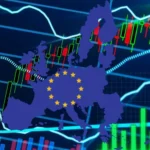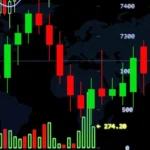Germany’s DAX, the benchmark stock index, achieved a record high as trading opened, displaying investors’ increasing confidence in imminent interest rate cuts that outweigh concerns about a potential recession in the country. The previous day saw the DAX closing at a record peak of 16,533 points, only to be surpassed on the following day at the market’s commencement. The index concluded the day 0.7% higher at 16,656 points, marking a new record.
Comprising the 40 most valuable companies in Europe’s largest economy, the DAX has experienced steady growth since late October. This ascent followed the revelation that inflation in the eurozone had significantly slowed, reaching its lowest point in over two years. The recent decline in inflation, coupled with the European Central Bank (ECB) board member Isabel Schnabel’s indication that further interest rate hikes are unlikely, has boosted investor expectations for rate cuts as early as March.
Investment strategist Lindsay James noted that the DAX’s positive trajectory is influenced by favorable news on inflation, with investors anticipating proactive measures by the ECB. The recent business surveys indicating a potential bottoming-out of Europe’s economy have also contributed to the index’s gains.
Despite these positive market movements, they appear at odds with the precarious state of the German economy, which lags behind other major regional economies. Germany’s GDP contracted by 0.1% in the third quarter, and industrial production in October marked the fifth consecutive month of decline. Official data also revealed a 3.7% fall in industrial orders for October, challenging economists’ expectations.
Ben Ritchie, head of developed market equities at investment company abrdn, explained the divergence between the DAX and the German economy, citing the index’s constituents’ modest exposure to the domestic economy and falling energy prices that support profitability. He added that lower overall inflation has contributed to the recent strong performance of the index.
Volkswagen, Europe’s largest carmaker, played a significant role in Wednesday’s gains on the DAX, with its stock closing 5.4% higher. The company recently announced independent audit results of a jointly owned plant in China, dispelling indications of forced labor and addressing criticism over alleged human rights abuses.
The market’s resilience and optimism reflect a complex interplay of global economic factors, including monetary policy expectations and corporate performance, against concerns about specific national economic challenges.










